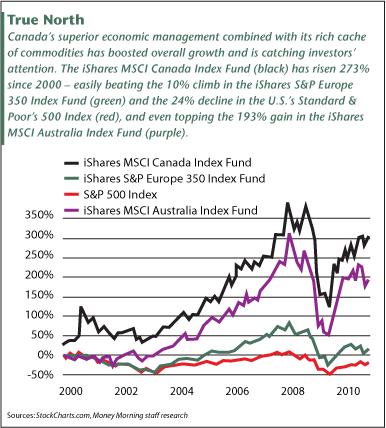If you're looking for a reliable investment, look no further than Canada.
It's strange, but with so much talk about troubles in the United States, Europe, China and the Middle East these days, one of the best-performing economies in the world is often overlooked.
Of course, that's finally started to change since the financial crisis has exposed our northern neighbor as a model economy - something the Group of 20 (G20) summit highlighted last weekend.
Suddenly, Canada is being held up as a shining light of sobriety, daring, common sense, and strong returns.
It largely sidestepped the entire global financial crisis of the past four years because its highly regulated banks were prohibited from securitizing mortgage debt to the extent that was widely practiced in the United States. Canada's banks also were banned from taking on high levels of leverage to make larger and riskier loans.
Canada's gross domestic product (GDP) is growing at a 6.1% clip, which is about 20% faster than the United States and leagues ahead of Europe. Its residential housing market is strong, and almost 75% of the jobs lost in the recession are back on line.
Five major banks dominate Canada, and regulators know each of the top bank executives personally, The Associated Press reported last week. Four of those banks are included in North America's top ten largest banks as measured by assets: Royal Bank of Canada (NYSE: RY), Toronto Dominion (NYSE: TD), Bank of Nova Scotia (NYSE: BNS) and Bank of Montreal (NYSE: BMO).
"Our banks were just better managed and we had better regulation," ex-Prime Minister Paul Martin told The AP. "I was absolutely amazed at senior bankers in the United States and Europe who didn't know the extent of the problem or they didn't know that people in some far-flung division were doing these kinds of things. It's just beyond belief."

The International Monetary Fund (IMF) recently said that Canada is likely to be the first of the seven major industrialized democracies to return to surplus by 2015, and last month it became the first such country to raise interest rates since the world financial crisis began.
If Canada were farther away and we had more perspective, we might see it as a larger and icier version of Australia, as they are both resource rich and have relatively small populations. In addition to a stable financial system, it has abundant oil, natural gas, uranium, gold, coal and water, plus an advanced industrial base and healthcare system.
Topping it off is the appeal of its plentiful oil sands, which are becoming increasingly attractive to the United States as companies shift away from offshore oil drilling.
As you can see in the chart above, its region fund has been one of the most stable in the world over the past 11 years, beating U.S. and European stocks by more than tenfold.
Posting those numbers Canada should have little trouble keeping its banks in enviable health and attracting new investments into its commodity-rich economy.
[Editor's Note: As this analysis demonstrates, Money Morning Contributing Writer Jon D. Markman has a unique view of both the world economy and the global financial markets. With uncertainty the watchword and volatility the norm in today's markets, low-risk/high-profit investments will be tougher than ever to find.
It will take a seasoned guide to uncover those opportunities.
Markman is that guide.
In the face of what's been the toughest market for investors since the Great Depression, it's time to sweep away the uncertainty and eradicate the worry. That's why investors subscribe to Markman's Strategic Advantage newsletter every week: He can see opportunity when other investors are blinded by worry.
Subscribe to Strategic Advantage and hire Markman to be your guide. For more information, please click here.]
News and Related Story Links:
- Money Morning:
G20 Summit Bogged Down by a Shaky Global Recovery
- Money Morning News Archive:
Canada Stories
- The Associated Press:
Canada's economy is suddenly the envy of the world - Department of Finance:
Canada is Leading the Way - Money Morning:
The Winners and Losers in the 'Commodities New World Order'
- Money Morning:
By Failing to Lock Up Canadian Oil Supplies, U.S. Exposes National Energy Plan Flaws


